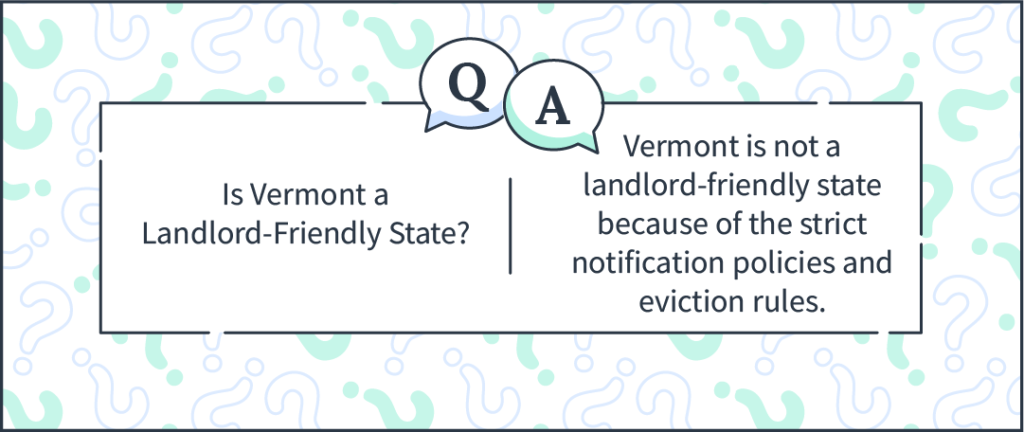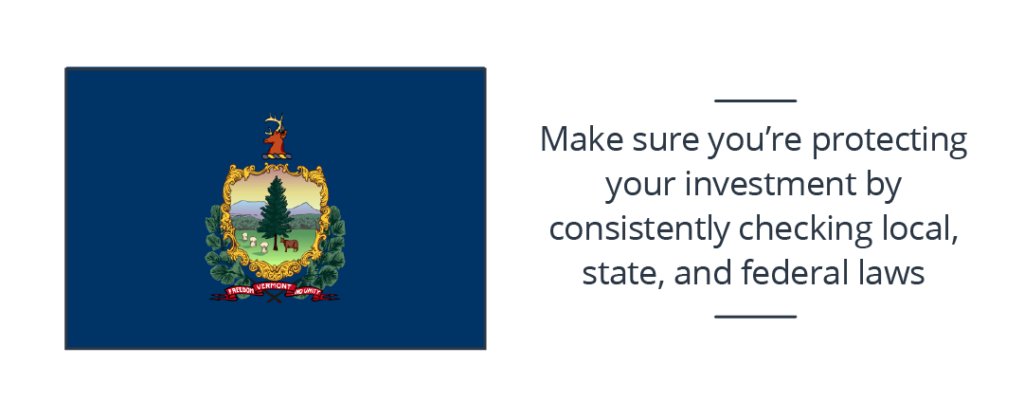Vermont is known as one of the safest states in the country, plus, it’s surrounded by beautiful scenery, which makes it an ideal location for those looking to relocate. The economic opportunity in Vermont also outbids other states, which is another enticing aspect for people wanting to move. As a landlord, people wanting to move to Vermont for the reasons mentioned above means a constant flow of renters. The state is also a popular tourist destination, which is helping the short-term rental market thrive.
Laws that impact the rental market, landlords, and tenants are constantly being decided in states. Make sure you know what’s on your ballot – find Vermont voting information.
Marketing. Applications. Leases. Payments.
Vermont Renters’ Rights and Landlord Responsibilities
- Have 14 days to return security deposit
- A 60-day notice required before raising rent
- A 48-hour notice required before entering the property
- Required to make repairs within 30 days
When it comes to Vermont rental laws, there are a few specifics landlords need to know:
- Security Deposit – Vermont does not limit the amount a landlord may charge for the security deposit. However, landlords must return the deposit within 14 days of the tenant moving out.
- Raising Rent – Landlords in Vermont may increase the rent to any amount for any reason with a 60-day notice.
- Notice of Entry – Vermont requires a 48-hour notice from the landlord before entering and may only enter between 9 a.m. and 9 p.m.
- Repairs – It is the landlord’s responsibility to keep the rental in safe and healthy living conditions. Landlords must make repairs within 30 days after being notified by the tenant. If the landlord fails to make repairs within this time frame, tenants may make the repairs themselves and deduct the cost from future rent payments or withhold rent altogether.
Vermont Landlords’ Rights and Tenant Responsibilities
- Tenants have 30 days to pay rent after they receive a notice
- Must give a 30-day notice before terminating a lease
- Tenants must keep the unit in safe and habitable condition
- A tenant has 60 days to claim abandoned property
- Late Fees – If a tenant is late on paying rent, the landlord may charge whatever they deem reasonable. If a check bounces, the landlord may only charge a maximum of $40.
- Special Protections – Victims of domestic violence and/or stalking may terminate their lease early if they provide proof of status to their landlord.
- Abandoned Property – If a tenant leaves behind personal property after they move out, the landlord must send them a written notice giving them 60 days to claim the property. After this period, the landlord may dispose of or sell the property.
- Maintaining The Property – Tenants in Vermont are responsible for keeping the property safe and habitable. They must also make minor repairs and make sure to not disturb neighbors.
Rental Application Fees
Application fees are not allowed in Vermont.
Criminal Background Checks
- HUD (Federal) laws do not classify criminal backgrounds as a protected class, but making a decision to rent based off a criminal background alone could lead to a discrimination charge as it impacts certain protected groups of people disproportionately.
- However, if the criminal background check revealed a crime for the manufacture and distribution of drugs, homicide and/or stalking, denying the application is allowed.
- Landlords should have a consistent and equal policy or procedure in place to follow regarding criminal background checks so as not to discriminate against one class of people over another.
- HUD states that a landlord cannot ask about arrest records, only convictions, as innocent people are commonly arrested though the situation may not have resulted in a conviction.
- Some municipalities may have written their own laws expanding onto what you can and cannot ask regarding criminal backgrounds during the tenant screening process.
Late Fees
Late fees are not allowed in Vermont. However, if rent is not received on or before the second day of the month, you may charge your tenant a reasonable percentage of your actual expenses incurred.
For example, if you missed your mortgage payment and you were charged an additional fee, then you may pass this onto the tenant.
Security Deposits
An itemization for all lawful deductions must be sent to tenant by hand delivery or mail.
Burlington/Barre Security Deposit specifics
- The security deposit and other deposits must not exceed one month’s rent.
- An additional pet deposit is allowed at ½ month’s rent.
- Security deposits must be deposited into interest-bearing account earning interest at a current Vermont bank passbook savings rate for the benefit of the tenant. Check your local bank for current rate.
- Security deposits must be returned to the tenant within 14 days after the lease ends.
- At that time, landlord must also hand-deliver or mail by certified mail a statement itemizing any lawful deductions to the tenant’s last known address.
- In that statement, the landlord must include information on the tenant’s right to request a hearing before the Burlington or Barre Housing Board regarding any deductions made to the tenant’s security deposit.
- The interest must be sent, or credited for any funds owed to the landlord, to the tenant when the lease expires.
Build a Vermont lease agreement in 15 minutes or less
Vermont Lease Agreement Sample
There are three sections to a residential lease agreement. The first section outlines the custom details of the contract, such as who’s involved and for what address. Here’s an example Vermont lease agreement listing details found in Section 1:
| Property Address: | 1200 Broadway Ave. Unit #104, Stowe, VT 05662 | |
| Lease Start Date: | 3/01/21 | See section 1.5 |
| Lease End Date: | 2/28/22 | See section 1.5 |
| Total Monthly Rent: | $1,620.00 | See section 1.6 |
| Monthly Base Rent: | $1,500.00 | See section 1.6 |
| Monthly Pet Rent: | $120.00 | See section 1.6 |
| Prorated Rent Amount: | $1,000.00 | See section 1.10 |
| Total Deposit(s): | $1,500 | See section 1.8 |
| Security Deposit: | N/A | See section 1.8 |
| Pet Deposit: | N/A | See section 1.8 |
| Other Deposit: | N/A | See section 1.8 |
| Total Non Refundable Fee(s): | $100.00 | See section 1.9 |
| Move-in Fee: Description | $100.00 | See section 1.9 |
| Late Fee: | Reasonable % of actual expenses incurred if not paid by the 2nd. | See section 2.1 |
Vermont Landlord-Tenant Law FAQ
Below are answers to some of the most commonly-asked questions when it comes to landlord-tenant laws in Vermont:
Can You Withhold Rent in Vermont?
Yes. If a landlord fails to make requested repairs, tenants may pay for the repairs themselves and deduct the cost from following rent payments or withhold rent altogether
How Long Does it Take to Evict a Tenant in Vermont?
Evicting a tenant in Vermont can take anywhere from 4 to 7 months, depending on the reason for eviction.
Is Vermont a Landlord-Friendly State?
Vermont is not a landlord-friendly state because of the strict notification policies and eviction rules.
What is the Eviction Process in Vermont?
There are five reasons a landlord may file for eviction in Vermont. The five reasons include failure to pay rent, violation of the lease agreement, the end of the lease term, sale of rental property, and illegal activity. Depending on the violation, the landlord must give the tenant notice and anywhere from 7 to 90 days to cure their violation.
If the tenant fails to cure or quit, then the landlord may file a complaint with the court, which costs $295. After the complaint is filed, it will be served to the tenant within 60 days.
After the tenant is served the summons, they must file an answer within 21 days. Afterward, the hearing will be scheduled.
If the court rules in favor of the landlord, then a writ of possession will be issued immediately. The tenant will have 14 days to move out.
How Much Notice Does a Landlord Have to Give a Tenant to Move Out in Vermont?
Landlords must give a 60-day notice before asking a tenant to vacate the property.
Due Diligence and Vermont Rental Laws
TurboTenant has utilized many municipal sources and official state statutes to compile this information to the best of our ability. However, local laws are constantly in flux, and landlords and tenants alike should do their due diligence and consult legal help when it’s needed. We hope the following list can serve as a valuable resource and allow you to succeed as a landlord or tenant in Vermont. Be sure to take proper precautions when it comes to finding the top candidates for your unit by utilizing our online rental application and tenant screening services.
Disclaimer: TurboTenant, Inc does not provide legal advice. This material has been prepared for informational purposes only. All users are advised to check all applicable local, state, and federal laws, and consult legal counsel should questions arise.
Vermont Landlord-Tenant Law Resources
Vermont Fair Housing Resources
Other State Resources
- Resources for Renters and Landlords – State of Vermont
- Agency of Commerce and Community Development website of Vermont
- Vermont Landlord and Tenant Duties
- Vermont’s Security Deposit Law
- Vermont Legal Eviction Process 2015 – Video







